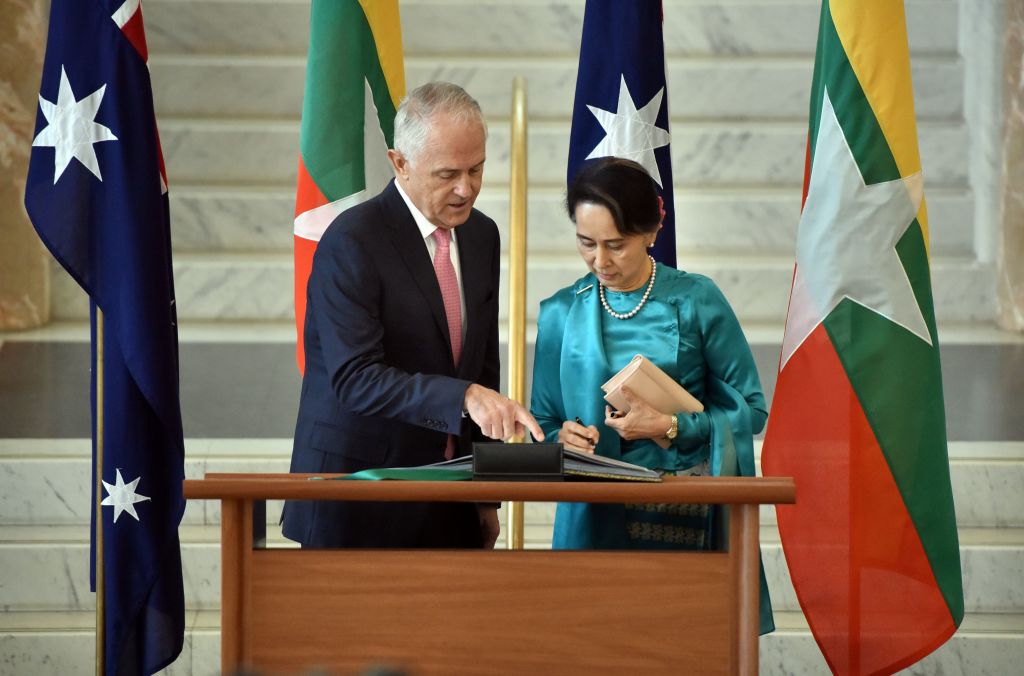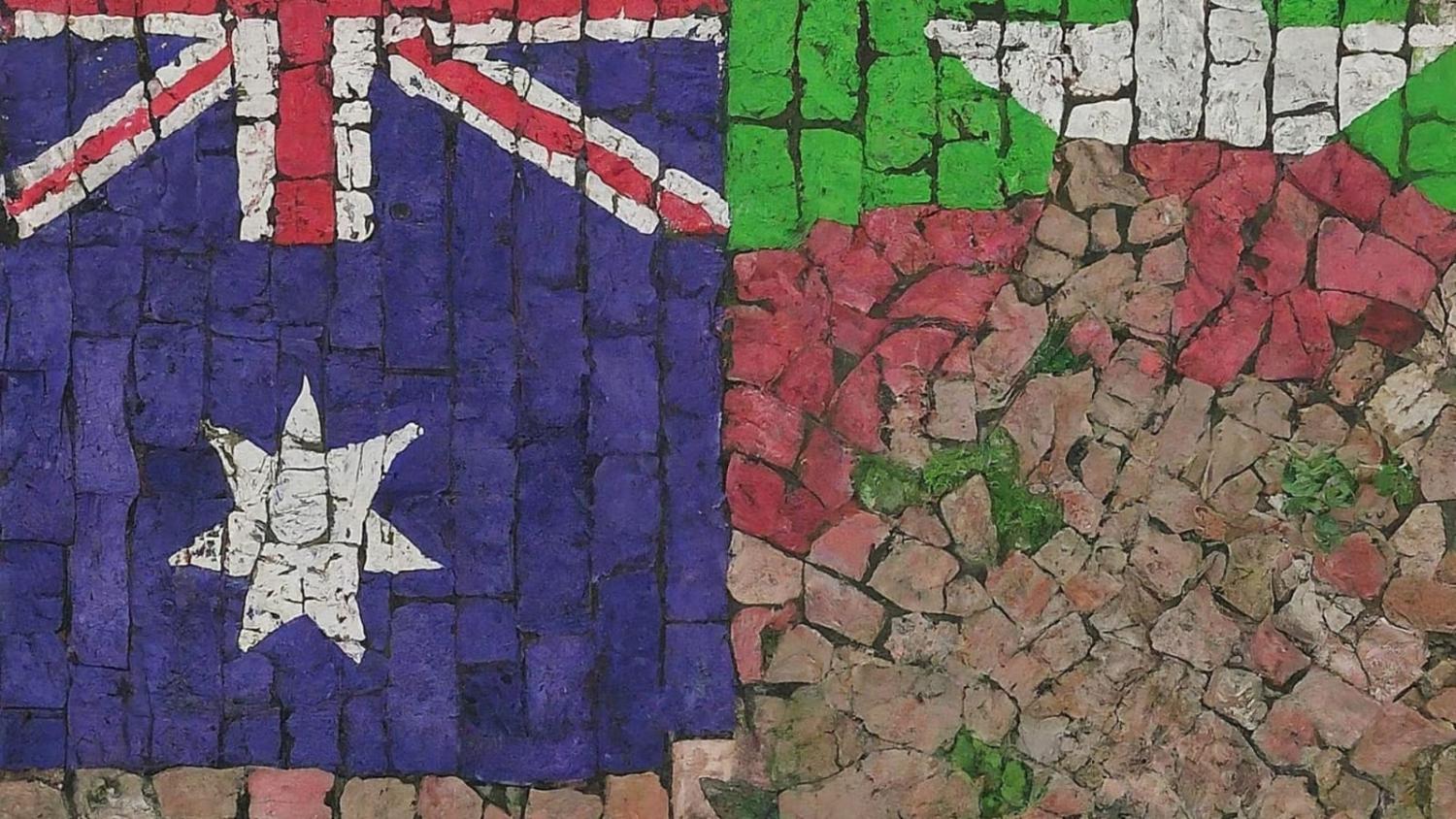A special Interpreter series ahead of the 2024 ASEAN-Australia Special Summit in Melbourne, 4-6 March. Read more articles in this thread.
Myanmar-Australia relations before and after Myanmar’s admission to ASEAN in 1997 can best be described as paved with good intentions. No peaks or troughs occurred in Australia’s interactions with then Burma after diplomatic relations were established in 1952. Burma then was mostly distant and abstract to many Australians, although for Second World War veterans, the country was a reminder of the gruelling Burma campaign and of the Burma-Thailand railway constructed by Allied prisoners of war.
Burma’s visibility to Australia and Australia’s visibility to Burma came in the 1970s, when Australia’s then prime minister Gough Whitlam – under whose watch ASEAN-Australia dialogue relations were established – visited Burma in February 1974. Whitlam had visited earlier in the 1960s, as deputy leader of the Opposition. His 1974 visit was reciprocated by Socialist Burma’s leader Ne Win the same year. Prime Minister Maung Maung Kha visited Australia in 1984, seeking assistance for Burma’s development, including in the minerals and mining sector. The brutal suppression of pro-democracy protests in 1988 slowed any momentum for development assistance. However, Australia also maintained a position against imposing sanctions on the military regime.
A practical and constructive intent thus characterises Australia-Myanmar relations before and after Myanmar became an ASEAN member. Australia stepped up this approach during Myanmar’s brief decade of opening and transition over 2011 to 2021, to support political, economic, and social reforms in Myanmar.
Australia’s development aid to Burma/Myanmar is thus a feature of bilateral relations, and has continued after the 2021 coup in Myanmar with a redirected focus on assisting the humanitarian and human security needs of the Myanmar people. Functional cooperation has continued, too, in trade and under the ASEAN framework. Australia is a primary supplier of wheat to Myanmar since the early years after Burma’s independence. Myanmar’s wheat imports from Australia in 2019 accounted for up to 90 per cent. Even after the 2021 coup, Australia supplied 63 per cent of Myanmar’s wheat imports in FY2021-22. Despite uncertainties resulting from economic mismanagement by the State Administration Council (SAC), Myanmar’s wheat imports from Australia will likely continue, as the preferential tariffs under the ASEAN-Australia New Zealand Free Trade Agreement (AANZFTA) offer lower import prices.
Australia has consistently sought to assist Myanmar build capacities for change. Under the ASEAN-Australia dialogue framework, Australia supported many capacity-building projects and activities involving Myanmar participants to expose the country’s security forces to international human rights standards. Australia’s approach to engaging military-ruled Myanmar was based on the belief that incremental engagement and capacity-building would help humanise Myanmar’s military and law enforcement and facilitate better civil-military relations. The ASEAN-Australia dialogue system provided a facilitating platform for Australian projects and programs supporting ASEAN’s overall efforts to assist the ASEAN Community-building project.
The Myanmar Police Force (MPF) was exposed to the ASEAN law enforcement network in 2005 through the Jakarta Centre for Law Enforcement Cooperation (JCLEC) foundation, a joint initiative between the Australian Federal Police (AFP) and the Indonesian National Police, formalised in 1997. Australia provided the first training programs for the MPF under the post-1988 military regime in Myanmar, through such ASEAN-linked mechanisms, and maintained a stance that Australia’s engagement with the MPF was part of a global counter-terrorism initiative at the time.
Australia’s capacity-building support for the MPF continued under the civilian government led by Aung San Suu Kyi. In 2016, the AFP signed a memorandum with the MPF to enhance transnational crime cooperation and intelligence-sharing. Australia’s practical stance continues today. The AFP shares intelligence with the MPF to counter drug trafficking. The rationale for continued interactions is based on a reasoning that keeping diplomatic back-channels open is necessary to prevent further inflows of drugs, such as methamphetamine, reaching the streets of Australia. This line of reasoning was initially voiced by Alexander Downer, Australian foreign minister at the time of Myanmar’s admission to ASEAN, on “drawing the regime into discussion on issues” of concern. That reasoning is also evident in Australia’s decision to continue providing training to the Myanmar military despite international pressure following the Rohingya crisis in 2017.

Earlier in 2013, the Australian government under then prime minister Julia Gillard had announced its intention to re-establish military ties with Myanmar. A defence attaché was appointed to Myanmar, reviving a position vacant since 1979, and marking the initial step in a gradual approach to restore bilateral military relations, though retaining arms embargoes. Australia incorporated Myanmar into the Defence Cooperation Program (DCP), with specific budget allocations for capacity development programs for the Myanmar military, focusing on non-combat areas.
Australia’s first moves for capacity-building in support of tentative democratic reforms in Myanmar started in 2012, in the area of education. Australia’s foreign minister Bob Carr pledged US$80 million in aid to boost education in Myanmar, as well as boosting the number of scholarships for Myanmar students in Australian higher education institutions, and encouraging research and analysis capacities of nascent Myanmar policy institutes and think tanks, particularly during Aung San Suu Kyi’s government, an initiative further highlighted during the discussion between Aung San Suu Kyi and then prime minister Tony Abbott in Australia in November 2013, and again in 2018 when attending the ASEAN-Australia Summit in Sydney.
To many now, Australia-Myanmar relations will bring to mind the SAC’s treatment of Professor Sean Turnell, special economic consultant to Aung San Suu Kyi and now a Nonresident Fellow at the Lowy Institute, whose influential book, Fiery Dragons, helped many researchers in and outside Myanmar, grasp the trajectory of Burma/Myanmar’s turbulent modern history through the lens of its financial institutions. Turnell’s arrest and subsequent imprisonment following the 2021 coup, placed a strain on Australia-Myanmar relations. Nevertheless, Australia supported – via the ASEAN channel – humanitarian assistance for Myanmar for Covid-19 pandemic response and other needs in the immediate aftermath of the coup. Australia was among the first to contribute to the ASEAN pledging conference to support humanitarian assistance for Myanmar in August 2021.
Australia suspended military cooperation with Myanmar after the military’s violent crackdown on protests against the 2021 coup. Since 2022, Australia’s diplomatic representation in Myanmar has been maintained at Chargé d’Affaires level. Australia, like many in the international community, supports ASEAN’s response to the Myanmar crisis, and seeks to aid affected and vulnerable populations. All the good intentions of Australia’s engagement policy towards Myanmar, to humanise the Myanmar security apparatus through training, and provide a constructive influence, do not seem to have been considered or received as such by the military leadership now heading the SAC in Myanmar. In February, leading up to the ASEAN-Australia Special Summit in Melbourne, Foreign Minister Penny Wong announced further sanctions against the military rulers, saying: “We recognise that Australia doesn’t dictate what happens in other countries, but we can influence, and part of that influence – not the only part – but part of those is to utilise sanctions strategically.”

